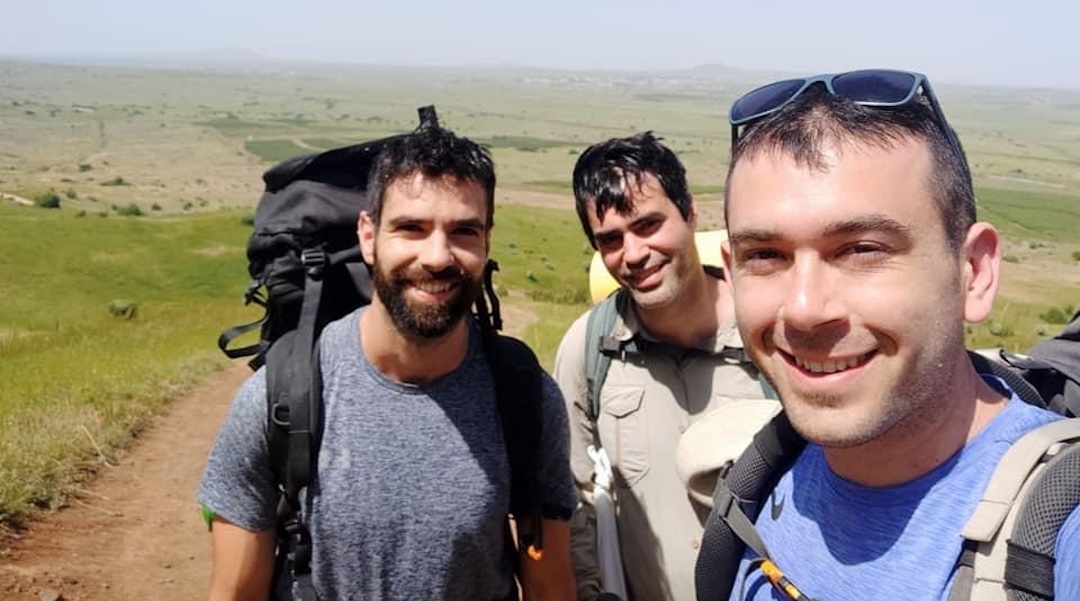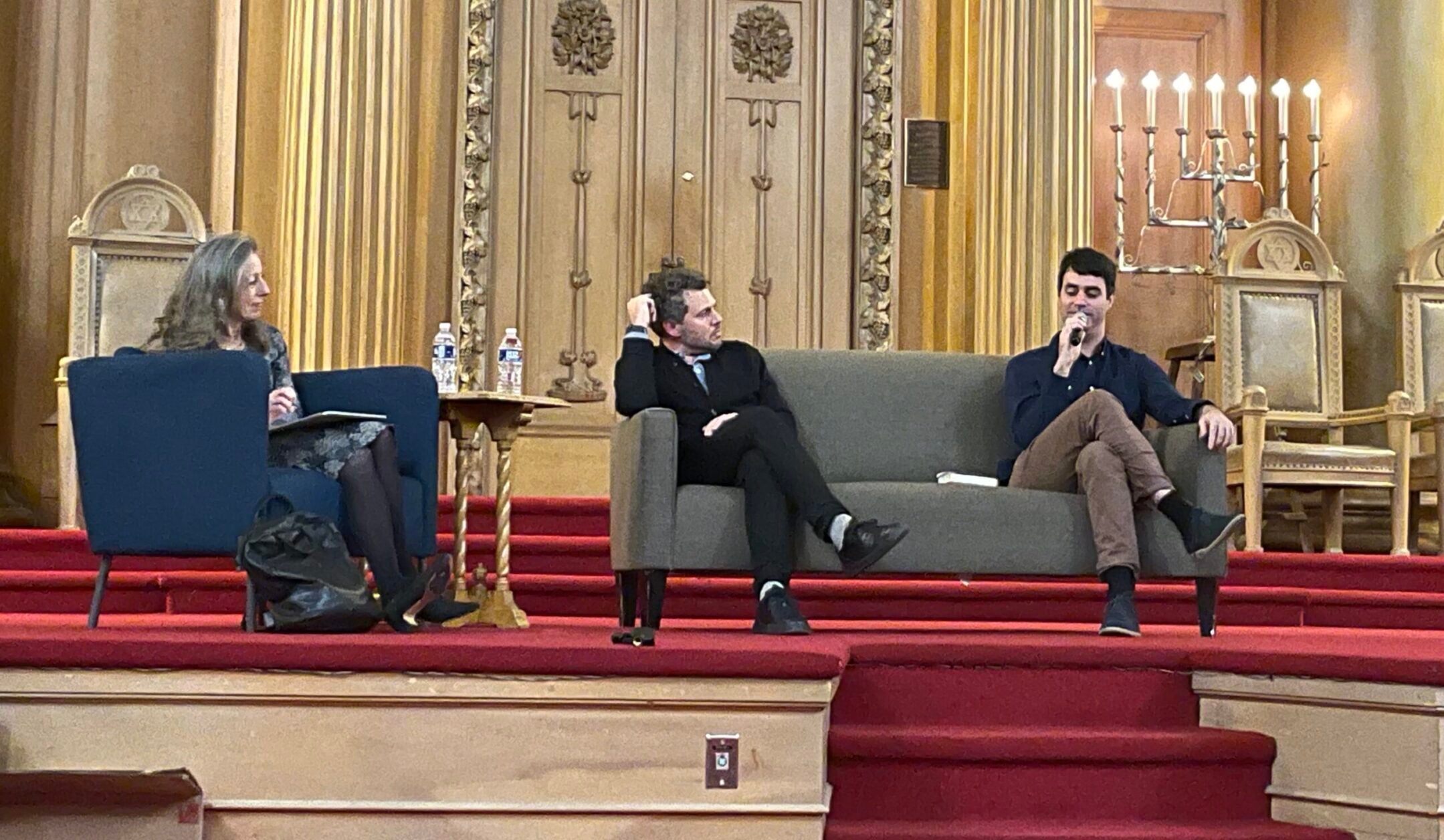An Israeli author was excited for his best friend’s wedding. After Oct. 7, it became a funeral.
Iddo Gefen’s surrealist fiction about Israel became a real-life nightmare

Iddo Gefen, center, seen hiking with his friend Sagi Golan, left, and another friend in an undated photo. (Courtesy of Gefen)
(JTA) — Like other Israelis around the world, Iddo Gefen spent the hours of Oct. 7 rifling through various news reports and messages from friends and family about the terror attacks unfolding in southern Israel.
But from his apartment in New York City, Gefen was specifically focused on the news about his good friend from childhood, Sagi Golan. The reservist had left his home in Herzliya, a city just north of Tel Aviv, to help the military efforts in Kibbutz Be’eri, one of the enclaves under attack from Hamas. Golan hadn’t waited for a command to do so — he just grabbed his gear and hit the road.
“He gave me a kiss on the lips, and he said [he’d be back in] ‘Less than a week,’” said Omer Ohana — who was due to marry Golan Oct. 20.
But Golan wouldn’t return. He died in the fighting at the kibbutz, after saving dozens of people from falling into Hamas’ hands, according to reports that Gefen has heard.
Just over two weeks later, Gefen found himself relaying this story Wednesday night at what was originally planned as a cheerful event to mark his winning this year’s Sami Rohr Prize, a prestigious $100,000 honor given to works that examine the “Jewish experience.” Gefen, 31, won for his short story collection “Jerusalem Beach,” which was first published in Israel in 2017. (The book became the first translated work to win the Sami Rohr Prize.)
In speaking with Gal Beckerman, a previous Sami Rohr winner, at Congregation Beth Elohim in Brooklyn, Gefen also talked about how reality has begun to imitate the semi-surrealist stories in his book. In one, “The Geriatric Platoon,” an old man decides to leave his family and enlist in the army in Israel’s south, where he believes Israel’s security is being threatened.
In reality, a 95-year-old man suited up for the war effort in the days after the events of Oct. 7 — which mostly took place in southern Israel, including on some of the same kibbutzes named in the story.

Ezra Yachin, 95, suited up in his Israeli military uniform to join the effort to defeat Hamas in the days after Hamas’ Oct. 7 attack on Israel. (MyIsrael/X)
“I heard [Israeli novelist] David Grossman say once that you write sometimes in hopes of protecting the people around you by creating realities that are far away from what’s really happening,” Gefen told the Jewish Telegraphic Agency on Thursday. “Sometimes we hope that literature and writing can be a way of shifting reality in a better way, but sometimes it just creates another angle on the reality we already live in.”
The Israel-Hamas war found its way into every question at Wednesday’s talk, even most of the ones that moderator Sandee Brawarsky — a former New York Jewish Week editor — asked about Gefen’s literary technique. Gefen opened up about his friendship with Golan and offered a specific portrait of what one Israeli deeply affected by the conflict has experienced over the past two weeks.
Since Golan’s wedding would instead be a funeral — which Jews traditionally hold as soon as possible after a person’s death — Gefen showed up at New York’s John F. Kennedy airport on Oct. 8, without a ticket in hand. Flights to Israel were scarce given the security situation, but with the help of volunteers aiding people in the airport, Gefen found himself on one of the few flights departing that day. He said El Al allowed 24 more people than there were seats on the plane; some sat on the ground, others sat in the cockpit or in the back with flight attendants.
He arrived in Israel around 4 p.m., with the funeral scheduled for 5 p.m., so he rushed to the cemetery. Golan’s family handed out flowers that were originally meant to be used in the wedding. Howling in tears, Ohana explained that the family had asked Ivri Lider, one of Israel’s biggest pop stars, to perform the song that Ohana and Golan had chosen for their first dance. Lider — who himself had lost a dear friend on Oct. 7 — showed up and played an acoustic version of the song “I Was Privileged to Love.”
Gefen had known Golan since childhood and described him as a funny, creative friend who was dedicated to volunteering and helping others. He even dedicated his novel to a slapstick character the pair had invented and embellished together.
After serving in an elite intelligence unit of the Israel Defense Forces — ironically one focused on saving hostages — Golan studied economics and political science, eventually finding himself at a high-paying job at a tech company that designed video games. But he left the job to work for TailorMed, which helps patients without health insurance get vital care and medications in emergency situations.
Gefen hasn’t quite fully come to terms with the enormous tragedy of the moment and he was surprised that Wednesday’s event — which was introduced by George Rohr, son of the prize’s late namesake philanthropist Sami Rohr — went on as planned. But he said he was able to turn it into a kind of therapeutic experience.

Iddo Gefen, at right, speaks with Gal Beckerman and Sandee Brawarsky at a New York Jewish Week event at Congregation Beth Elohim in Brooklyn, Oct. 25, 2023. (Philissa Cramer)
“I think one of the things that is important for me in this situation is to talk about Sagi. Having the chance for people to know about him and his story as much as possible — I think that’s one of the motivations of going up and speaking in this time,” he said.
Despite the fact that “Jerusalem Beach” was a hit in Israel and established Gefen as a rising star there, he chose to enroll in a neuroscience PhD program at Columbia University, which he is finishing soon. His research focuses on memory and decision-making, and many of his stories explore this terrain, including “Debbie’s Dream House,” told from the perspective of a man who gets a job manufacturing nightmares. The story, he said, has been optioned by Ryan Gosling’s film production company.
Gefen has already published another novel, “Mrs. Lilienblum’s Cloud Factory,” and an English translation will be out next year. Will he continue working in neuroscience while using the prize money to continue to work on books? He’s not sure. But he does know that his writing feels invigorated with a new sense of purpose.
“When I wrote the book [‘Jerusalem Beach’], if somebody would ask me, do I have any message with my writing, I would say, ‘no, everybody needs to find their own message.’ And today, I think from the last year and especially since the past few weeks, I think in the end, all these stories do talk about the importance of compassion and humanity and the fact that some humans can do horrible stuff, but they’re also there to comfort and help each other,” he said. “And I think literature at its best is also a place people can look to for comfort. It doesn’t always help, but sometimes it has value.”
This article originally appeared on JTA.org.
A message from our Publisher & CEO Rachel Fishman Feddersen

I hope you appreciated this article. Before you go, I’d like to ask you to please support the Forward’s award-winning, nonprofit journalism so that we can be prepared for whatever news 2025 brings.
At a time when other newsrooms are closing or cutting back, the Forward has removed its paywall and invested additional resources to report on the ground from Israel and around the U.S. on the impact of the war, rising antisemitism and polarized discourse.
Readers like you make it all possible. Support our work by becoming a Forward Member and connect with our journalism and your community.
— Rachel Fishman Feddersen, Publisher and CEO

























